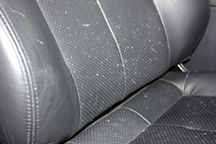A Hidden Pandemic: Bacteria, Mold, and Workplace Safety
 Pathogens like toxic mold and dangerous bacteria have reached pandemic levels throughout North America and constitute a significant workplace health threat. That’s particularly true of fleet vehicles, which are constantly exposed to microbial infection. In his presentation at NAFA's 2019 Institute & Expo, Stephen Dunn, CEO of Purifyd Systems, warned that seat belts, steering wheels, door panels, and airflow systems are breeding grounds for dangerous bacterial contaminants and must be disinfected regularly.
Pathogens like toxic mold and dangerous bacteria have reached pandemic levels throughout North America and constitute a significant workplace health threat. That’s particularly true of fleet vehicles, which are constantly exposed to microbial infection. In his presentation at NAFA's 2019 Institute & Expo, Stephen Dunn, CEO of Purifyd Systems, warned that seat belts, steering wheels, door panels, and airflow systems are breeding grounds for dangerous bacterial contaminants and must be disinfected regularly.
Unfortunately, there is a general lack of awareness among fleet managers and no federal standards governing the control and remediation of bacterial infection in fleet vehicles.
Public and Workplace Concerns - Dunn explained that a confluence of demographic and biological factors are behind the crisis, and has caused public concern to mount. Climate change, growing population density, greater population mobility, and digital media’s increasing involvement have forced the situation into the light of public scrutiny.
These are major concerns for fleet managers, who stand at risk of losing productivity and staff to chronic illness, respiratory problems, allergies, and fatigue. Contamination affects worker well-being, hiring and employee retention, management/union relationships, continuity of service, and perception of performance. Employees who are constantly exposed to a toxic workplace environment tend to report sick more often, lose motivation, and are more likely to leave the organization.
Preventative and Proactive - “Don’t be reactive,” Dunn urged. “Don’t wait to act because, by then, the damage has already started. Put preventative programs into action, like monthly remedial treatments.” Companies that take this approach experience improved employee well-being, fewer complaints and less sick time, Dunn said.
Dunn, whose company is based in British Columbia, said Purifyd Systems was called to help the British Columbia Royal Canadian Mounted Police (RCMP), which was experiencing illness at such a high rate that it was having trouble keeping patrol cars on the road. Thanks to Purifyd’s remedial action plan, the RCMP was able to keep the infection under control and maintain a healthier workplace, which improved attendance and productivity.
Air filters were replaced regularly and hydrogen peroxide and ammonium spray was applied inside air ducts and injected through the evaporator coils of each vehicle every month. All in all, vehicle remediation takes about 15 minutes, Dunn said.
Dunn recommended that fleet managers work to create awareness among staff of the dangers that bacteria and mold represent. Watch for complaints and illness among employees, test vehicles regularly (a simple handheld device can identify pathogens), and initiate a preventive action plan as soon as possible.
NAFA Fleet Management Association
http://www.nafa.org/
 Pathogens like toxic mold and dangerous bacteria have reached pandemic levels throughout North America and constitute a significant workplace health threat. That’s particularly true of fleet vehicles, which are constantly exposed to microbial infection. In his presentation at NAFA's 2019 Institute & Expo, Stephen Dunn, CEO of Purifyd Systems, warned that seat belts, steering wheels, door panels, and airflow systems are breeding grounds for dangerous bacterial contaminants and must be disinfected regularly.
Pathogens like toxic mold and dangerous bacteria have reached pandemic levels throughout North America and constitute a significant workplace health threat. That’s particularly true of fleet vehicles, which are constantly exposed to microbial infection. In his presentation at NAFA's 2019 Institute & Expo, Stephen Dunn, CEO of Purifyd Systems, warned that seat belts, steering wheels, door panels, and airflow systems are breeding grounds for dangerous bacterial contaminants and must be disinfected regularly.